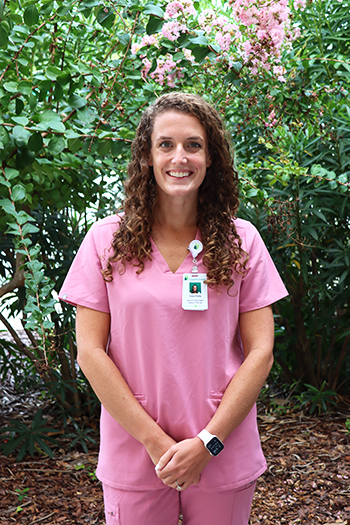How outpatient speech therapy helps following a stroke
Neurology
Trouble remembering, speaking or swallowing? St. Joseph’s/Candler speech language pathologist explains how outpatient speech therapy can help.
You had a stroke. Thankfully, you have recovered well enough to return to the comfort of your home. But maybe you notice some bodily functions not working as they once did.
It could be you are having trouble remembering things.
Maybe you get words confused.
Or you are finding it difficult or uncomfortable to swallow liquids or solids.
It can even be something that once seemed simple like balancing your bank account or driving a car.
Outpatient speech therapy at St. Joseph’s/Candler can help with all of that.

“When you are at the point in your treatment to come to outpatient speech therapy, we really focus on correcting the deficits to increase your independence, whether that’s going back to work or continuing with your former activities of daily life,” says Courtney Horne, speech language pathologist with the Candler Hospital Outpatient Rehabilitation Center. “Educating the patient and caregiver and developing strategies to overcome those deficits are our main goals.”
What is speech therapy?
Speech therapy uses different modalities to help improve vital skills, such as communication, cognition and swallowing. Our speech-language pathologists (SLPs) often work with patients who suffer from stroke, traumatic brain injuries, movement disorders and cancers that affect speech and swallowing.
We offer speech therapy in an inpatient and outpatient setting, as well as employing SLPs who work on our Home Health Care team.
Related Article: What is speech therapy?
How outpatient speech therapy helps stroke patients
A stroke can occur in different parts of the brain, leaving patients with different side effects during their recovery. If the stroke occurs in the left hemisphere, it largely affects language because that side of the brain controls your language function, Horne explains.
A stroke also can damage certain cranial nerves that can cause muscles to stop working, most often the muscles that help you swallow.
Of all the patients Horne sees, nearly 50 percent have had a stroke. She helps both males and females and is seeing stroke patients range in age as young as 40 to their 80s. Difficulty with communication, cognition and swallowing are three areas Horne most often helps her stroke patients overcome.
Let’s take a look at how outpatient speech therapy can help with these conditions.
Communication and cognition
Cognitive communication is the ability to understand what you are saying and communicate it in an effective way, Horne explains. The “communication” part can include verbal expression, responding accurately or simply finding the right word to say. Cognitive complications include problem solving, memory loss and difficulty paying attention.
Say, for example, a patient comes in with a complaint of verbal expression. After an initial evaluation, Horne will develop strategies to help this patient. One method is circumlocution, in which the patient is encouraged to talk around the word or use more words than necessary to express something.
Another practice is called semantic feature analysis, which identifies different components of the word. For example, maybe the patient is trying to say he wants a glass of milk, but can’t remember the word milk. In this case, semantic feature analysis is taught to use words that describe milk, such as white, cold, something you drink or in the refrigerator.
Then there are patients who know the word but are unable to form the appropriate sounds to get that word out, also known as apraxia of speech. With these patients, Horne will focus on speech production using different approaches such as mouth and lip reading, tapping and singing songs.
For those patients suffering with cognition, Horne will introduce methods to help improve those deficits. For instance, if you are communicating fairly well, but are having difficulty interviewing for a job, Horne can work with you on those specific communication skills. If memory loss is an issue, there are many applications Horne can show you both in person and those you can do at home to improve memory function.
Swallowing
Not as frequently, but Horne also helps patients in an outpatient setting with swallowing. Oftentimes, swallowing is a key function we like to get you to return to before you leave the hospital. However, some patients are ready to go home but still have difficulty swallowing. Outpatient speech therapy can help.
Horne first focuses on safety. “We look at putting swallow compensatory strategies into place that make sure their swallowing is safe and effective. The first priority is making sure their swallow function and what they are eating is safe for them, and they are not at risk for aspirating.”
Horne can suggest a safe diet based on their current capabilities. She may also introduce modalities such as taking an extra sip of water to help get a solid down or slightly turning your head to swallow better. There are also devices available that help improve your muscles and breathing so it’s easier to swallow.
“Coming to us is a good next stop in your treatment because we focus on the functionality needs to get you back to where you were before your stroke or help adjust to a new normal,” Horne says. “We take the time to explain what’s going on with their deficits and provide them with a lot of resources to help them understand. Helping the caregiver is important to us as well.”
A referral is needed for outpatient speech therapy. Sessions can last up to an hour, once or twice a week and up to 12 weeks depending on the severity of your condition. For more information, help with a referral or to schedule an appointment, call the Candler Hospital Outpatient Rehabilitation Center at 912-819-6176.